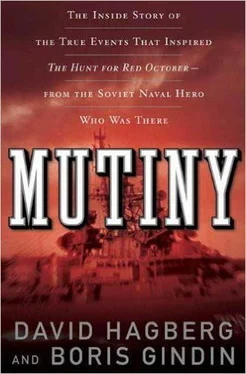After the KGB’s interrogation, during which one of the investigators even shared a bottle of vodka with Boris in the military prison where the crew was held, Gindin was demoted one rank and sent ashore to work at a fire department, as mentioned earlier. He hadn’t done enough to stop the mutiny. He was worthless. He was a traitor. He was a Jew.
Two years later he sent a letter to the Ministry of Defense requesting permission to resign his navy commission and return to civilian life. Such requests were rarely granted, and then it usually took a year or more for an answer to come from Moscow.
But within three weeks Gindin got his permission to resign and went to the only place he knew he’d be safe, home in Pushkin, to be with his mother.
It was only a one-bedroom apartment, and within a few weeks after Boris got home his sister, Ella, got a divorce and moved back with her two children, Vladik, ten, and Julia, three.
“The adjustment was tough,” Gindin remembers.
There was no privacy, no quiet time for him to figure out what to do next. And yet being surrounded by family, by a sense of normalcy in a world that, for him, had gone insane, was just the ticket to help him deal with the pain of a bright future that had gone up in smoke.
Ella worked as as Russian literature teacher at a trade school, where she got Gindin a job teaching auto mechanics. Their mother was receiving a pension of forty rubles a month from the state, which was impossible to live on, so Ella and Boris contributed most of their income to help run the household.
After a few months the shock of leaving the navy finally started to wear off and Gindin began to think about meeting a girl, getting married, and starting a family. But with almost no money left over at the end of each month and with no real prospects for any sort of a meaningful career ahead of him a marriage was not likely. It was the reality of living in Russia as a nobody.
“I had to deal with it, one day at a time, so that my wounds could heal.”
Nevertheless, three months later his uncle Boris on his mother’s side introduced him to Yana Shnaydman. Boris was twenty-eight and she was nineteen, in her second year studying economics and finance at the St. Petersburg State University of Economics and Finance.
“It was love at first sight for both of us,” Gindin says. “I couldn’t keep my eyes off her. She was tall, and she had dark long curly hair and brown eyes. She had that lethal combination of beauty and brains. She was fun to be around, easygoing, always smiling. I wanted to impress her and give her a good life, which wasn’t so easy under the circumstances.”
He took a construction job in the evenings and taught during the day at the trade school, which left him and Yana only a couple of hours first thing in the mornings to go on dates. It wasn’t anything fancy. He would take a train to Leningrad, where they would walk through the busy streets until it was time for him to return to school in Pushkin.
They dated for only six weeks before they got married and moved into an apartment in Leningrad with another couple. A year later their son, Vladimir, was born, and shortly after that they finally got permission to get their own apartment, a tiny studio in the city, and they were in seventh heaven.
Yana took one year off from school to stay with the baby, while Boris moved from job to job, trying to find something decent enough so that they could live.
By the time Vladimir was three, Yana had graduated with her master’s in economics and got a full-time job—her parents helped with babysitting duties. Boris landed a position as maintenance supervisor at an elevator company, and they were able to move into a two-bedroom apartment and take an occasional vacation.
“Though our lives started to become financially steady, it was still a constant struggle to get basic stuff like groceries. Store shelves were almost always empty. Everyone was looking to make friends with someone in the grocery or clothing business, so that they could trade favors for a piece of meat or cheese or something imported to wear. Whatever was manufactured in Russia at the time was ugly and disgusting.
“People drank a lot. Liquor stores opened at eleven in the morning and long lines of people were waiting every morning to get in. People dealt with the pain of hopelessness by drinking vodka, which was cheap and plentiful.
“Russia was the perfect place in which to rot until you died.”
But not everything was so black-and-white. Leningrad was a major cultural center. Boris and Yana went to the theaters, took long walks down the streets and boulevards during the White Nights, and visited the beautiful parks scattered throughout the city’s suburbs. As their son, Vladimir, was growing up they were able to show him the beauty of Russia’s most European city.
“These were the greatest moments of our lives, when we could escape from our reality,” Gindin recalls.
But then they began to hear about the exodus of Jews from the Soviet Union. At first it was mostly rumors, which seemed unreal. But after a while even the rumors couldn’t be ignored. A new mood of a kind was spreading across the country, as Jews were being blamed for everything from the lousy food to the acute shortage of decent jobs. Kids who heard their parents talk about being a Jew as if it were some sort of disease brought their hatreds to the schoolyards.
“Why don’t you go to Israel, you hebes, and leave the good jobs for us?”
“Why don’t you get out of here, you bastards, and stop taking the apartments we need?”
“Stop eating our food!”
“Stop poisoning our vodka!”
“Die!”
Boris and Yana decided that it was time to leave. But there was a serious problem. He had resigned his commission in 1978, and by law he would not be allowed to leave the country for ten years. There was no way around it. They would have to tough it out for another five years, with the odds against them and Jews getting out every month. The Soviet Union was sliding into chaos, and the Jews, not Moscow, were being blamed.
On top of that, Gindin wasn’t at all sure what sort of a firestorm the KGB might bring down on him if he applied for emigration papers.
And there were even more roadblocks against getting out of the country. Leaving the Soviet Union has never been easy, especially not for Jews—even though they were never wanted in the first place. The Soviets would rather have exterminated them all than admit that anyone would actually want to leave the country.
The Gindins stuck it out until Boris could legally apply to leave the country, but that’s when the real difficulties began.
First he and Yana had to quit working. No one with a job could even ask for an exit visa. And the application process to OV&R, the Department for Visas and Registrations, took at least five or six months, which meant they had to survive that long without an income.
When they were given the green light they had to pack everything they could take with them and sell everything else, then fly to Moscow to pick up the visas, which in their case turned out to be handwritten, not typed, documents, which would later cause them a lot of trouble on the outside.
“Of course during the three months while we waited for our approvals to come from Moscow, Yanawas kicked out of Komsomol; our neighbors and co-workers turned against us, calling us traitors and other names,” Gindin recalls. “Even our friends disapproved, and in some ways worst of all was the condemnation we got from other Jews who still weren’t ready to leave.”
The Gindins decided to go to the United States, not Israel, because of the stories they were beginning to hear about opportunities. It was a bit of irony that a man who’d pledged himself to fight the evil capitalists by becoming a naval officer ended up taking his family to America. But their eyes were fully open by then to the harsh realities of life in the Soviet Union.
Читать дальше












